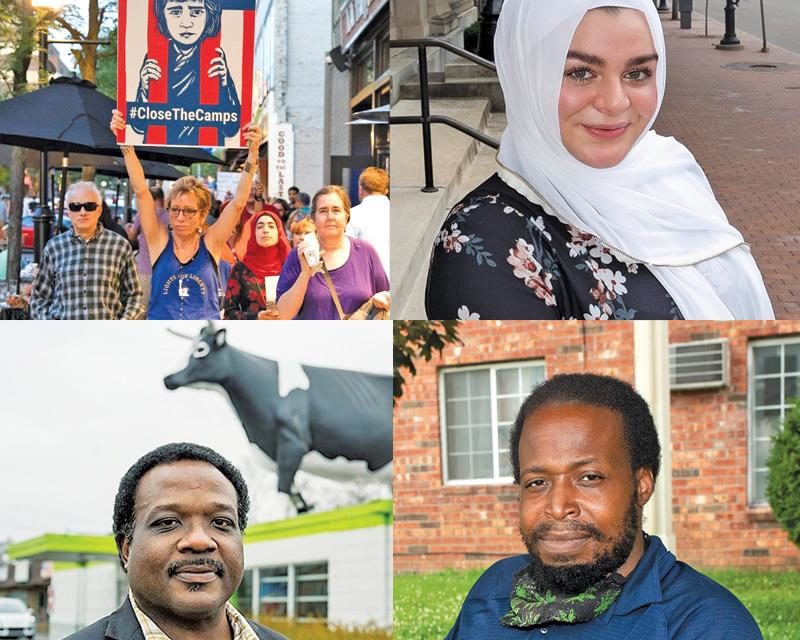The protesters appeared like a holy procession, holding flickering candles in perfect silence, demonstrating against the detention camps on the U.S.-Mexico border. The 800-strong Lights for Liberty participants walked down Main St. and turned on Liberty. On that summer evening last year, car show participants, shop-goers, and restaurant patrons watched the slow march.
Later, a woman posted on the event’s Facebook page, saying she was deeply affected by the procession. “She wrote this essay about how, there she was, sitting in her privilege sipping her cold rose on a summer night. Then, she saw the silent protesters march by. She says it moved her to tears and moved her to realize she needs to do more to be a part of the change,” says Corky Wattles, Lights for Liberty’s organizer and Ann Arbor activist.
For Wattles, these epiphanies remind her why she became a political organizer. “We moved her into action. To me, if I got one more person on board to be a part of the change, Hallelujah.”
Scenes like this are not a rarity in Ann Arbor, where activism has long been a way of life. More than a century ago, women campaigned for the right to vote. In the 1960s, black and white residents picketed City Hall to end racial discrimination in housing, and the Students for a Democratic Society mobilized protests against the Vietnam War.
In the 1970s, a U-M environmental teach-in laid the groundwork for the first Earth Day, and a “freedom rally” featuring cultural icons John Lennon, Allen Ginsberg, Yoko Ono, and Stevie Wonder helped win marijuana martyr John Sinclair’s release from prison. The Black Action Movement demanded increased black enrollment at the U-M. Then and later, the women’s and LGBTQ movements found ardent vocal supporters in both university students and city residents.
—
Though the issues and causes have evolved over the years, the setting has remained the same–the city of Ann Arbor.
According to Wattles, the city’s ties to the university lend a heightened awareness of political issues and engagement. Its rich history also informs its present relationship to activism.
“Students for a Democratic Society had a profound impact on ending the Vietnam War and that kind of impact does not end when the organization ends,” says Wattles. “The energy of that movement lives on, on the campus of the U of M. People and movements die but their energy never does.”
The sixty-four-year-old activist’s political awakening came early. Growing up in Warren, Wattles experienced her political campaigning at fourteen, when her father ran for state representative. She discovered her talent for organizing, corralling people, and planning events in high school. She has been protesting ever since, including organizing a bus trip to the 2018 March for Our Lives protest in Washington, D.C. The movement began in response to the Marjory Stoneman Douglas High School shooting in Florida. Almost two million students, parents, and allies marched through the capital advocating for legislation to prevent gun violence in schools.
“I think that’s where I excel as an activist,” Wattles says. “I can organize a rally and I can organize a bus trip and the logistics of getting hotel rooms and getting people down there.”
She also raised money to bring six teens from the Neutral Zone to the march. “These kids said about their experience … ‘This will make me an activist for life,’ ” Wattles recalls.
Wattles has witnessed how activism has evolved over the years. In particular, the rise of social media has made it easier to engage people in social justice issues. The Lights for Liberty march “was just a Twitter movement. And so I said ‘Okay, this, I can do this.’ And I know how to put a rally together and do social media marketing. It was a huge success.”
She’s learned a new vocabulary, too, like being “woke.” She defines it as “when you’re willing to absorb and examine with societal evidence and change your perspectives and beliefs.” With the present reevaluation of racism’s roots within institutions, systems, and culture, she says, that includes listening as an ally and doing her research through reading.
Though Wattles considers herself one of the “old white rabble rousers,” she says her generation still must do “the work to understand how hardwired into the very foundation of this republic racism is.”
—
For nineteen-year-old Zaynab Elkolaly, activism was thrust upon her at ten years old, when she began wearing a hijab. “A white man called me a terrorist when I was with my mother. So, I realized there was something wrong with the world,” she says.
She began reading books and researching marginalized communities in the U.S. and around the world. At the Michigan Islamic Academy, she raised consciousness about these issues with her peers. At Washtenaw Technical Middle College, she expanded into national and international activism. And in 2018, she founded the Human Rights Youth Coalition, which uses community dialogues to mobilize around human rights atrocities, particularly the repercussions of U.S. interventionism overseas.
Now a U-M student, Elkolaly is also involved in Know Your IX, a national organization that, in the words of its website, “aims to empower students to end sexual and dating violence in their schools.” Survivor activists help educate their peers and advocate for policy changes.
Though her activism can be broken down into categories, Elkolaly doesn’t see it that way. “I wholeheartedly believe that every cause is intertwined,” she says. “You don’t have racial justice, environmental justice, economic justice, or gender justice. Every oppression is placed within our community in our country.”
Her faith inspires her. “It’s a tenet of Islam to uphold justice and overthrow oppressors,” she says. “I believe that it’s an act of worship to advocate for marginalized communities and [the] oppressions they face.”
In addition to organizing and planning, Elkolaly continues to protest in the streets, especially in the wake of the May 2020 killing of George Floyd in Minneapolis. “I believe that putting your body on the line is especially important for somebody of a lighter complexion like me,” she says. “Automatically, I’m going to have more privilege than a black hijabi. So, in the case of protest, I am going to put my body between the police and them.”
—
For political organizer and housing advocate Alex Thomas, activism is rooted in the city’s heart. “Ann Arbor has a rich tradition and community of activism. And there was a lot of grassroots community activism about providing housing for people,” he says.
Thomas, fifty, once lived in a residence operated by Avalon Housing. Now he’s on the board. Founded in 1992 to shift the response to homelessness in Ann Arbor from providing temporary shelter to long-term, supportive housing, Avalon now houses approximately 900 people in more than twenty-five properties. Many had been homeless for years and face mental health and substance use issues.
“I’m really proud of the association,” says Thomas. “I was one of their first tenants in ’92. My first venture into activism was organizing the tenant’s association.” The Pilot Light Project planned activities that included gardening, voter registration, softball games, and movie nights.
Thomas moved out of the country to pursue other interests but returned to Michigan to care for his elderly mother in 2016.
He found his old neighborhood, West Willow in Ypsilanti Township, in decline. “So, I started getting involved with my neighborhood association. I wanted to find out what was best practice and just get a better understanding of the area.”
He says the largest obstacle in dealing with the area’s housing crisis is a lack of understanding, particularly of the communities east of US-23 that have borne the brunt of it. “You have housing prices steadily increasing in Ann Arbor encroaching upon the housing market in eastern Washtenaw County,” he says. That has the effect of “driving up the prices and forcing vulnerable people out due to spending a disproportionate amount of their income on housing costs.”
As a former tenant of Avalon, Thomas can empathize. “If you haven’t been at the mercy of the housing market and not been able to find affordable housing, it’s theoretical for you. There’s things you just can’t know. So that definitely informs my perspective as a board member, just having a closer connection to the issues in a more informed understanding of what that experience is.”
Thomas defines activism as educating yourself and taking action on your interests. “Learn about and understand where the power centers are–why are things the way they are in that inner circle that you’re in?” he says. “You have to approach it with the seriousness that you profess.”
—
In the days following George Floyd’s killing, Terril Cotton asked on Facebook if there was going to be a protest in Ypsilanti or Ann Arbor. The thirty-seven-year-old Ann Arbor resident’s question sparked an online dialogue and a flurry of activity. Cotton was later told that almost 4,000 people came to the protest he inadvertently organized.
Though Cotton had previously attended protests in response to the killing of black men by police, it was his first time initiating one. Cotton found a reason to speak up for George Floyd. “The man literally landed crying and screaming for his mom while he was dying.”
At other rallies, he’d noticed that mainly those in higher positions of power had the opportunity to speak. So he organized a “people’s mic” to give voice to a wider range of community members. “I think it’s good for everybody to speak up because we are trying to get rid of racism,” Cotton says. “Even if we are saying black lives, I think everybody should speak up.”
Cotton has a physical disability that makes transportation difficult, but he never found this to be a reason not to protest.
“Yes, I will continue to be involved in activism in the future,” Cotton says. “There’s always something that needs to change.”
Despite their various approaches and causes, Wattles, Cotton, Thomas, and Elkolaly are united by the passion to uplift others in their community, schools, country, and world. Elkolaly offers an eloquently hopeful summation: “No matter what, no matter how much threatened by your peers or some sort of oppressive party, do everything that you do unapologetically, and realize that courage is more important than fear, [that] you are not alone, and that your power will ultimately reign victorious.”



Dear Ms. Molina,
Nice to read your article on the faces of Ann Arbor political activism, but omitted was the longest running street protest in Ann Arbor history
I’m speaking about our weekly anti-Israel protests at Beth Israel Congregation, which have been occurring every Saturday morning for well over 16 years
Whether one agrees or disagrees with our messages, it must be granted that we fit the bill: “Persistence and Protest”
The Observer even covered our activities back in its May, 2006 edition: an article by James Militzer called “Sacred Ground – The Israeli-Palestinian Conflict in Ann Arbor”
Hopefully, Witness for Peace will graces the pages of the Observer the next time this topic is presented
Many thanks
Henry Herskovitz